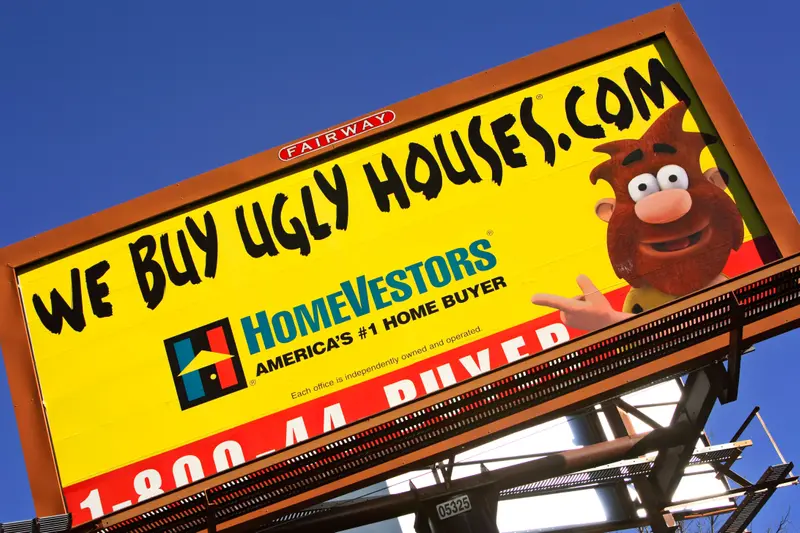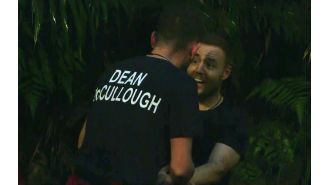HomeVestors Praised ProPublica’s Reporting, Then Tried to “Bury It”
The “We Buy Ugly Houses” company held a virtual meeting for its franchises to outline a plan to “minimize visibility” of our investigation.

On April 18, HomeVestors of America executives held a virtual meeting for its nearly 1,150 franchisees. The purpose: Alert local “We Buy Ugly Houses” operations about a forthcoming ProPublica investigation into their business tactics.
“It is not going to be flattering for us,” HomeVestors CEO David Hicks warned.
Our reporting found HomeVestors franchisees who used deception and targeted the elderly, infirm and those so close to poverty that they feared homelessness would be a consequence of selling. The franchisees were trained by HomeVestors to look for signs of desperation and pounce on so-called distressed sellers. Many used legal tactics, described as predatory by five experts, to trap sellers in below-market deals.
A HomeVestors spokesperson said in a statement that ProPublica’s reporting examined a small fraction of the more than 71,400 homes bought by its franchises since 2016. "We do not discriminate or target our advertising to any specific demographic groups based on age, race, or socio-economic status,” the company said. It has removed several franchises and is investigating some cases identified by ProPublica to “determine appropriate action.”
After we first contacted the company in early March, a former FBI spokesperson who specializes in “crisis and special situations” and “reputation management” began answering questions on their behalf.
Hicks, through this spokesperson, declined requests for interviews. But during the virtual meeting — which ProPublica obtained a recording of — the CEO alternated between accusing the news organization of writing “attack articles” and praising the rigor of our investigation.
“It’s amazing what they have brought up,” he said.
In a slide titled “Public Relations,” Hicks outlined HomeVestors’ plan to drown out ProPublica’s story with “strategic ad buys on social and web pages” and “SEO content to minimize visibility” of the article.
He instructed franchisees not to click on ProPublica’s story link; doing so, he warned, might improve its internet search ranking.
“Our goal is to bury it,” he said.
The company did not respond to a ProPublica question about executives telling franchisees that they want to bury the story. But in a statement, HomeVestors wrote, “As a company, we embrace any opportunity to improve customer service and satisfaction. We used the meeting to reinforce our code of conduct and company tenets that emphasize the importance of doing the right thing for our sellers and our communities.”
During the same webinar, Hicks and other senior leaders announced new policies to end the very practices ProPublica’s investigation brought to light.
On April 11, HomeVestors updated its “Systems and Standards” to forbid franchises from clouding sellers’ titles, a maneuver that makes it difficult for homeowners to back out of a deal. The company discouraged franchisees from suing sellers for breach of contract. And it reiterated that buyers who deal with seniors should always involve family, attorneys or other guardians in the transaction.
Some franchise owners on the call pushed back on the changes, claiming they could hurt business. But HomeVestors general counsel Anthony Lowenberg was unequivocal: Those who regularly sue to enforce the sale of homes are “putting the entire system at risk,” he said.
“The juice is not worth the squeeze,” Hicks added, repeating a comment from a franchise owner in the call’s chat.
Maren Kasper, managing director at Bayview Asset Management, the investment management firm that bought HomeVestors in 2022, also spoke during the virtual meeting. Kasper said that ProPublica had uncovered two cases of improper behavior that HomeVestors had not known about. “Those franchises have since received default letters,” she said, referring to a formal notice that they are not in compliance with company policies.
In the course of our reporting, we sent the company questions that detailed our findings point by point. We issued similar letters to each franchise mentioned in the story. In all cases, we allowed ample time to respond.
During the webinar, Kasper acknowledged the depth and thoroughness of our investigation.
“They have scoured every corner of the internet,” she said. “They’ve done, you know, good reporting, I would say.” She predicted other inquiries might follow. “If the Department of Justice came knocking, and needed us to verify every answer that we provided to this reporter, we have all the data and materials to do so,” she said.
“This is going to make us a better company,” Hicks concluded. “Because overall, we're going to change some of our practices, and make sure we change our Systems and Standards to make sure that we have our franchise doing the right things.”
A few days after the webinar, HomeVestors sent its franchises an email unveiling a webpage to address and counter ProPublica’s story. Among the offerings: a copy of its corporate response, a list of talking points and the number for a “rapid response media hotline.” When a ProPublica reporter called the hotline, a company representative declined to answer questions or provide comment.
The email, signed by Hicks and HomeVestors COO Larry Goodman, also contained a warning for franchisees:
“Don’t get baited into arguments or ‘off the record’ conversations.”
ProPublica is a nonprofit newsroom that investigates abuses of power. Sign up to receive our biggest stories as soon as they’re published.
ProPublica is a nonprofit newsroom that investigates abuses of power. Sign up to receive our biggest stories as soon as they’re published.






